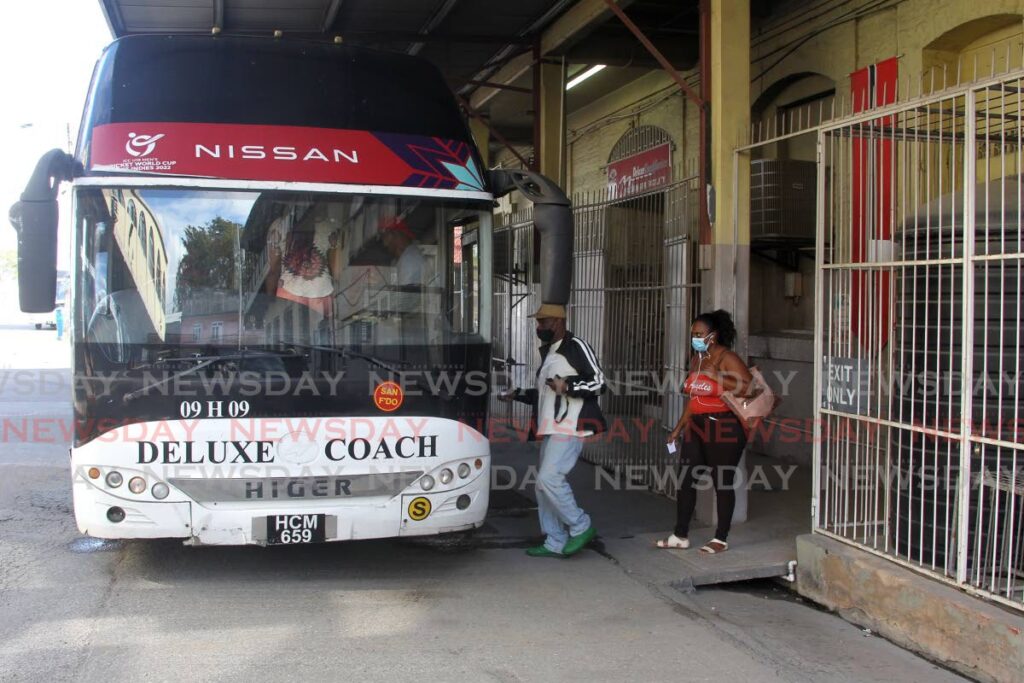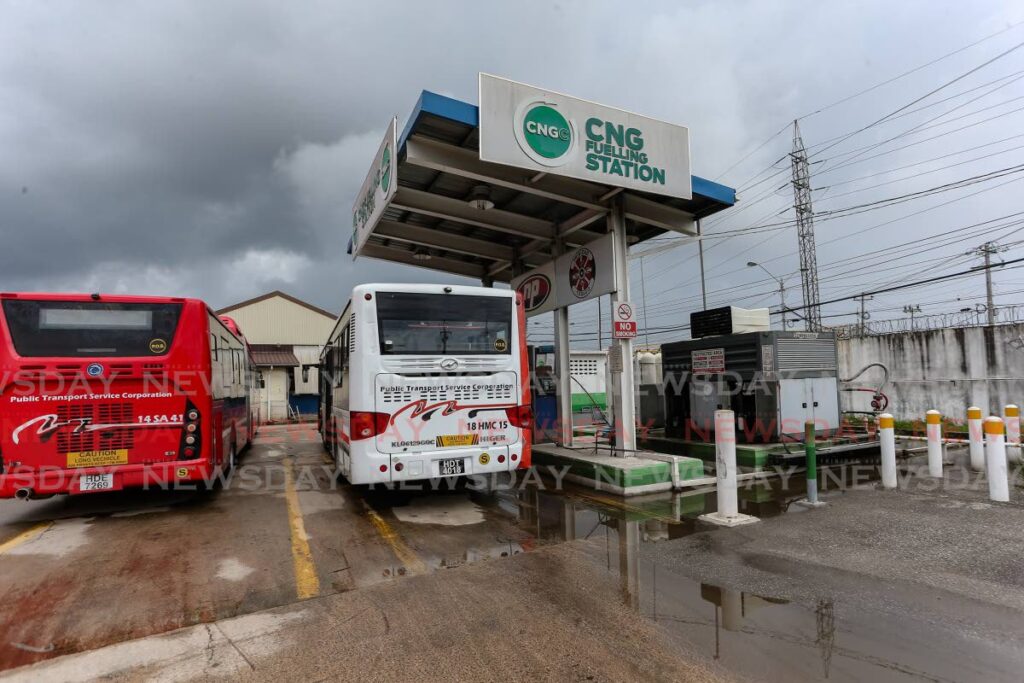PTSC chairman reveals new business model to generate income

VISHANNA PHAGOO
The Public Transport Service Corporation (PTSC) is planning to create "multi-modal complexes" in Trinidad and Tobago as a way to earn more revenue, which its chairman Edwin Gooding says will help reduce the state enterprise's reliance on government funding.
"That complex is going to have spaces for all modes of transport to rent like motorcycles, maxis and taxis," he said, as well as accommodate the bus service.
Gooding shared the vision for transforming the PTSC, which includes electric buses, expanding routes, greater use of technology, domestic tourism and environmentally-friendly practices.
While the plan is not finalised, Gooding said locations identified for the complexes are Tarouba Link Road, San Fernando; Factory Road, Chaguanas; Rio Claro; and Sangster's Hill, Tobago.
Each complex will also have a garage, including charging ports for electric buses, and commercial spaces for business owners to rent. He hopes with the new innovations, the PTSC's satisfied customer rate will increase to 90 per cent (it is currently 69.3 per cent).
Gooding said with this proposal, the PTSC can depend less on the government, since 90 per cent of its funding comes from yearly allocations to cover expenditure which includes: salaries, wages, pension, insurance, security and maintaining buses.

The company's aim is to become independent, and, in the short term, is working to reduce its government funding to 70 per cent. For the 2021/2022 fiscal year, the Ministry of Works and Transport was allocated over $2 billion, of which the PTSC received an estimated $14.2 million.
Gooding said the complexes will incorporate a "park and ride" initiative for the working public to park their cars at any location and take a bus to and from work, instead of worrying about secured parking.
He said the PTSC is determined to provide more reliable services for commuters with the hope of getting more people to use the service.
The cost of the infrastructure is yet to be determined but the San Fernando location has been assessed and an estimate is being worked out. He said part of the design is to use solar energy to limit electricity use. He hopes the proposal will be approved by the ministry, and, if it so, work can begin this year and be completed in 2023.
Also being worked out is the acquisition of electric buses. In December 2021, Minister of Works and Transport Rohan Sinanan had promised to add new electric buses to the PTSC fleet in 2022. He said an initial plan to acquire 300 electric buses had been amended to include a mix of electric and diesel vehicles. At that time Sinanan could not give an estimate of how many of the buses would arrive this year, citing delays owing to the covid19 pandemic.
Gooding told Business Day tenders are to be issued and while costs are still to be determined, he hoped the first fleet can be brought in next year. Financing and approvals would have to be sought from the government. He said with more buses, routes can be increased to 163 from 79.
The PTSC's plans for providing a better service includes e-services.
"We are also acquiring
an integrated smart transport solution, and that is an IT solution which is going to provide better scheduling of buses, better rostering of drivers and e-ticketing, where you can pay with your (credit) card so you can access the bus anywhere," he said.
"We would also have a mobile app for our commuters to be able to track the buses and find out what time the bus is going to come." This is opposed to the current system of physical tickets and the need to have them before boarding the bus. Gooding said an app is yet to be approved.

He said he also wants to ease the hassle on passengers by having trips directly from Port of Spain to Point Fortin, Cedros or Siparia, with other areas to be determined, since there is a high demand during peak hours – 4.30-9 am and 2-6 pm.
As part of the initiative to use sunlight as an energy source, Gooding said the PTSC would move to limit its carbon footprint with compressed natural gas (CNG) buses, and launched a CNG fuel station at the City Gate, South Quay, Port of Spain hub in April. The company works with over 200 buses, of which 71 run on CNG. When approved, the electric buses, would further reduce the reliance on diesel.
The PTSC also plans to use rainwater, which will be collected in 1,000-gallon tanks at all bus depots, starting with the South Quay terminal, to wash the buses.
The PTSC is also working on creating artificial reefs with the help of the University of TT (UTT), which has been working with the PTSC to determine whether nonfunctioning bus parts can be placed among marine life without destroying it.
"We want to show that the material used to make the buses can in fact be sunken without affecting the plant and animal life around it."
The PTSC also has arrangements with National Petroleum Co Ltd (NP) and Solid Waste Management Company (SWMCOL) to ensure used oil, tyres and batteries are discarded properly as a way of being more environmentally friendly. NP collects the used oil and through a tenders list, a sub-contractor is hired to recycle the waste. Oil that cannot be recycled is sent to an Indian company to be disposed of.
He said the PTSC retreads its tyres but those that cannot be retreaded are sent to SWMCOL to be discarded or repurposed. Bus batteries are also a source of income: dead batteries are sold to companies with the highest bid or best proposal.
The PTSC plans to expand and refurbish bus sheds and terminals under its bus stop programme. So far renovations have been done on terminal malls at Curepe, San Juan, Tunapuna and Arima, with rewiring left to do at the Curepe and San Juan terminals. According to the 2021/2022 budget, the upgrades began in 2019 among other infrastructural projects that amounted to $7.5 million.

The PTSC operates 79 routes and some routes include residential areas such as Bon Air Gardens, Oropune, Maloney Gardens, D'Abadie, La Horquetta, Arima, and Edinburgh 500, Chaguanas.
Gooding said it offers routes around the country including to Blanchisseuse from Maracas and to Guayaguayare from San Fernando and Sangre Grande, but, the most popular routes include Port of Spain to San Fernando and Port of Spain to Arima or Sangre Grande along the East-West Corridor.
The company also engages in domestic tourism. It created an Easter package in April called "Bus it to the beach and celebrate," which took passengers to Mayaro, Blanchisseuse and Manzanilla beaches for fares that ranged from $40 to $60. He said the next step is to sell tour guide packages that will vary in price to hotels to gain more revenue and boost tourism.
The PTSC currently employs 1,600 staff members and has an estimated 500 drivers.
The drivers are responsible for ensuring the buses go out every hour at off-peak times and every 15 minutes during peak times. He added a system will be planned and introduced to ease long lines at terminals.
As for maintenance, Gooding said drivers are responsible for giving details of the problems so the buses can be assessed and repaired or wrecked. He said there are on average 40 shutdowns per month and the company's rescue response team takes the stalled buses back to the depot.

Gooding said the company receives between ten and 12 customer complaints a month but would like to see fewer. When the PTSC receives reports of discourteous bus drivers, the report is documented, the drivers identified and the deputy general manager implements disciplinary action.
"When we have issues with drivers, that is where we have to move quickly, because the driver is the face of the corporation, and if we have courteous drivers, we will have happy commuters."
He said PTSC's communication team follows up with the person who made the complaint to guarantee satisfaction.
Gooding told passengers and potential passengers that even with the PTSC's development plans, the prices of bus tickets will remain the same, ranging between $4 and $12, depending on the routes.

Comments
"PTSC chairman reveals new business model to generate income"